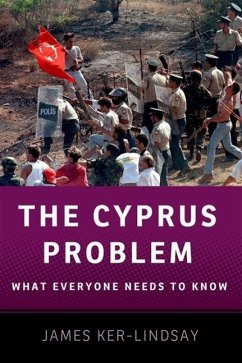James Ker-Lindsay (Senior Research Fellow, Senior Research Fellow,
The Cyprus Problem
What Everyone Needs to Know
20,99 €
inkl. MwSt.
Sofort lieferbar

10 °P sammeln
James Ker-Lindsay (Senior Research Fellow, Senior Research Fellow,
The Cyprus Problem
What Everyone Needs to Know
- Broschiertes Buch
- Merkliste
- Auf die Merkliste
- Bewerten Bewerten
- Teilen
- Produkt teilen
- Produkterinnerung
- Produkterinnerung
A concise guide to one of the most confounding and seemingly irresolvable international conflicts for almost half a century.
Andere Kunden interessierten sich auch für
![The Israeli-Palestinian Conflict The Israeli-Palestinian Conflict]() Dov Waxman (Rosalinde and Arthur Gilbert Foundation Professor of IsThe Israeli-Palestinian Conflict18,99 €
Dov Waxman (Rosalinde and Arthur Gilbert Foundation Professor of IsThe Israeli-Palestinian Conflict18,99 €![The Philippines The Philippines]() Steven Rood (Visting Fellow and Visting Fel Country RepresentativeThe Philippines18,99 €
Steven Rood (Visting Fellow and Visting Fel Country RepresentativeThe Philippines18,99 €![The New Middle East The New Middle East]() James L. Gelvin (Professor, Professor, University of California, LoThe New Middle East50,99 €
James L. Gelvin (Professor, Professor, University of California, LoThe New Middle East50,99 €![Chinese Foreign Policy Toward the Middle East Chinese Foreign Policy Toward the Middle East]() Kadir TemizChinese Foreign Policy Toward the Middle East45,99 €
Kadir TemizChinese Foreign Policy Toward the Middle East45,99 €![The Opioid Epidemic The Opioid Epidemic]() Yngvild Olsen (Medical Director, Medical Director, Institutes for BThe Opioid Epidemic18,99 €
Yngvild Olsen (Medical Director, Medical Director, Institutes for BThe Opioid Epidemic18,99 €![The Gun Debate The Gun Debate]() Philip J. Cook (ITT / Terry Sanford Professor of Public Policy and PrThe Gun Debate19,99 €
Philip J. Cook (ITT / Terry Sanford Professor of Public Policy and PrThe Gun Debate19,99 €![India in the 21st Century India in the 21st Century]() Mira Kamdar (Senior Fellow at the World Policy Institute and an AssIndia in the 21st Century19,99 €
Mira Kamdar (Senior Fellow at the World Policy Institute and an AssIndia in the 21st Century19,99 €-
-
-
A concise guide to one of the most confounding and seemingly irresolvable international conflicts for almost half a century.
Produktdetails
- Produktdetails
- What Everyone Needs To KnowÂ
- Verlag: Oxford University Press Inc
- Seitenzahl: 148
- Erscheinungstermin: 1. April 2011
- Englisch
- Abmessung: 216mm x 140mm x 9mm
- Gewicht: 200g
- ISBN-13: 9780199757152
- ISBN-10: 0199757151
- Artikelnr.: 32730439
- Herstellerkennzeichnung
- Libri GmbH
- Europaallee 1
- 36244 Bad Hersfeld
- gpsr@libri.de
- What Everyone Needs To KnowÂ
- Verlag: Oxford University Press Inc
- Seitenzahl: 148
- Erscheinungstermin: 1. April 2011
- Englisch
- Abmessung: 216mm x 140mm x 9mm
- Gewicht: 200g
- ISBN-13: 9780199757152
- ISBN-10: 0199757151
- Artikelnr.: 32730439
- Herstellerkennzeichnung
- Libri GmbH
- Europaallee 1
- 36244 Bad Hersfeld
- gpsr@libri.de
James Ker-Lindsay is the Eurobank EFG Senior Research Fellow on the Politics of South East Europe at the London School of Economics. He is the author of Crisis and Conciliation: A Year of Rapprochement Between Greece and Turkey and EU Accession and UN Peacemaking in Cyprus.
* Introduction
* Social and Historical Background
* What and where is Cyprus?
* Who are the Greek Cypriots?
* Who are the Turkish Cypriots?
* What other communities live on the island?
* Who ruled Cyprus in the past?
* How did Cyprus become a part of the Ottoman Empire and what were its
effects?
* When and why did Cyprus come under British control?
* What were Enosis and the Megali Idea?
* How did British rule develop in Cyprus?
* What was EOKA campaign and how did it develop?
* Was the EOKA uprising anti-Turkish?
* How did Britain respond to the uprising?
* What were the Zürich-London Agreements and why did they emerge?
* How did the 1960 Constitution divide powers between the communities?
* Who and what are the Guarantor Powers?
* What sort of military presence were the Guarantor Powers granted on
the island?
* Constitutional Collapse, 1960-1974
* What did the two communities think of their new state?
* How did the constitution break down?
* What were the 13 constitutional amendments proposed by Makarios?
* How did fighting start between the two communities in 1963, and was
it planned?
* Did the Turkish Cypriot leave the government or were they forced out?
* How did the UN establish a peacekeeping presence on the island?
* Why is UN Security Council Resolution 186 so important?
* What was the Acheson Plan?
* How did the UN Mission of Good Offices emerge?
* What led to the Greek military coup in Cyprus in 1974?
* How did the Turkish invasion happen?
* Was the Turkish invasion legal and was it a conspiracy?
* A DIVIDED ISLAND, 1974
* What were the effects of the invasion on the two communities?
* What were the High Level Agreements?
* When and why did the Turkish Cypriot unilaterally declare
independence?
* What was the 'Draft Framework Agreement'?
* What was the 'Set of Ideas'?
* What was the Loizidou case?
* How did Cyprus become a candidate for EU membership?
* What was the Turkish response to the EU decision to accept Cyprus as
a candidate?
* How did the EU accession affect the reunification talks?
* Why was the Green Line opened?
* How did the final version of the Annan Plan emerge?
* What did the Annan Plan propose?
* What support did the proposals receive?
* Why did the Greek Cypriot oppose the Annan Plan?
* What were the consequences of the vote for the two sides?
* Should Cyprus have been allowed to join the European Union still
divided?
* What was the July 2006 agreement?
* How did new talks emerge in 2008?
* The Key Issues
* What is meant by a bizonal, bicommunal federation?
* What does 'political equality' mean in terms of a solution?
* What sort of federal system and governmental structure do the sides
want?
* Will the Republic of Cyprus continue to exist after a settlement?
* Will the territory of the states correspond to the current division
of the island?
* How will property issues be addressed?
* Will there be freedom of movement and settlement across the island?
* Will all Turkish settlers have to leave the island?
* Will the Treaties of Guarantee and Alliance continue?
* What assurances will exist that an agreement be implemented?
* Will Britain have to give up its military bases as part of a
settlement?
* What will be the relationship between Cyprus and the EU?
* How will the economic aspects of a solution be managed?
* Current and Future Settlement Efforts
* Will the UN retain responsibility for peacemaking and peacekeeping?
* What part does the UN Security Council play in settlement efforts?
* What is the 'European Solution' to the Cyprus Problem?
* Has EU accession changed the parameters of a solution?
* Is a settlement linked to Turkey's EU membership?
* What role does Greece play in settlement efforts?
* Can the current status quo continue indefinitely?
* Will future settlement efforts be based on a federal solution?
* Could a solution be based on a confederation or a unitary state?
* Are enosis or taksim still possible options?
* Could the TRNC be recognized?
* Is formal partition a 'fair and viable' solution?
* Suggestions for Further Reading
* Social and Historical Background
* What and where is Cyprus?
* Who are the Greek Cypriots?
* Who are the Turkish Cypriots?
* What other communities live on the island?
* Who ruled Cyprus in the past?
* How did Cyprus become a part of the Ottoman Empire and what were its
effects?
* When and why did Cyprus come under British control?
* What were Enosis and the Megali Idea?
* How did British rule develop in Cyprus?
* What was EOKA campaign and how did it develop?
* Was the EOKA uprising anti-Turkish?
* How did Britain respond to the uprising?
* What were the Zürich-London Agreements and why did they emerge?
* How did the 1960 Constitution divide powers between the communities?
* Who and what are the Guarantor Powers?
* What sort of military presence were the Guarantor Powers granted on
the island?
* Constitutional Collapse, 1960-1974
* What did the two communities think of their new state?
* How did the constitution break down?
* What were the 13 constitutional amendments proposed by Makarios?
* How did fighting start between the two communities in 1963, and was
it planned?
* Did the Turkish Cypriot leave the government or were they forced out?
* How did the UN establish a peacekeeping presence on the island?
* Why is UN Security Council Resolution 186 so important?
* What was the Acheson Plan?
* How did the UN Mission of Good Offices emerge?
* What led to the Greek military coup in Cyprus in 1974?
* How did the Turkish invasion happen?
* Was the Turkish invasion legal and was it a conspiracy?
* A DIVIDED ISLAND, 1974
* What were the effects of the invasion on the two communities?
* What were the High Level Agreements?
* When and why did the Turkish Cypriot unilaterally declare
independence?
* What was the 'Draft Framework Agreement'?
* What was the 'Set of Ideas'?
* What was the Loizidou case?
* How did Cyprus become a candidate for EU membership?
* What was the Turkish response to the EU decision to accept Cyprus as
a candidate?
* How did the EU accession affect the reunification talks?
* Why was the Green Line opened?
* How did the final version of the Annan Plan emerge?
* What did the Annan Plan propose?
* What support did the proposals receive?
* Why did the Greek Cypriot oppose the Annan Plan?
* What were the consequences of the vote for the two sides?
* Should Cyprus have been allowed to join the European Union still
divided?
* What was the July 2006 agreement?
* How did new talks emerge in 2008?
* The Key Issues
* What is meant by a bizonal, bicommunal federation?
* What does 'political equality' mean in terms of a solution?
* What sort of federal system and governmental structure do the sides
want?
* Will the Republic of Cyprus continue to exist after a settlement?
* Will the territory of the states correspond to the current division
of the island?
* How will property issues be addressed?
* Will there be freedom of movement and settlement across the island?
* Will all Turkish settlers have to leave the island?
* Will the Treaties of Guarantee and Alliance continue?
* What assurances will exist that an agreement be implemented?
* Will Britain have to give up its military bases as part of a
settlement?
* What will be the relationship between Cyprus and the EU?
* How will the economic aspects of a solution be managed?
* Current and Future Settlement Efforts
* Will the UN retain responsibility for peacemaking and peacekeeping?
* What part does the UN Security Council play in settlement efforts?
* What is the 'European Solution' to the Cyprus Problem?
* Has EU accession changed the parameters of a solution?
* Is a settlement linked to Turkey's EU membership?
* What role does Greece play in settlement efforts?
* Can the current status quo continue indefinitely?
* Will future settlement efforts be based on a federal solution?
* Could a solution be based on a confederation or a unitary state?
* Are enosis or taksim still possible options?
* Could the TRNC be recognized?
* Is formal partition a 'fair and viable' solution?
* Suggestions for Further Reading
* Introduction
* Social and Historical Background
* What and where is Cyprus?
* Who are the Greek Cypriots?
* Who are the Turkish Cypriots?
* What other communities live on the island?
* Who ruled Cyprus in the past?
* How did Cyprus become a part of the Ottoman Empire and what were its
effects?
* When and why did Cyprus come under British control?
* What were Enosis and the Megali Idea?
* How did British rule develop in Cyprus?
* What was EOKA campaign and how did it develop?
* Was the EOKA uprising anti-Turkish?
* How did Britain respond to the uprising?
* What were the Zürich-London Agreements and why did they emerge?
* How did the 1960 Constitution divide powers between the communities?
* Who and what are the Guarantor Powers?
* What sort of military presence were the Guarantor Powers granted on
the island?
* Constitutional Collapse, 1960-1974
* What did the two communities think of their new state?
* How did the constitution break down?
* What were the 13 constitutional amendments proposed by Makarios?
* How did fighting start between the two communities in 1963, and was
it planned?
* Did the Turkish Cypriot leave the government or were they forced out?
* How did the UN establish a peacekeeping presence on the island?
* Why is UN Security Council Resolution 186 so important?
* What was the Acheson Plan?
* How did the UN Mission of Good Offices emerge?
* What led to the Greek military coup in Cyprus in 1974?
* How did the Turkish invasion happen?
* Was the Turkish invasion legal and was it a conspiracy?
* A DIVIDED ISLAND, 1974
* What were the effects of the invasion on the two communities?
* What were the High Level Agreements?
* When and why did the Turkish Cypriot unilaterally declare
independence?
* What was the 'Draft Framework Agreement'?
* What was the 'Set of Ideas'?
* What was the Loizidou case?
* How did Cyprus become a candidate for EU membership?
* What was the Turkish response to the EU decision to accept Cyprus as
a candidate?
* How did the EU accession affect the reunification talks?
* Why was the Green Line opened?
* How did the final version of the Annan Plan emerge?
* What did the Annan Plan propose?
* What support did the proposals receive?
* Why did the Greek Cypriot oppose the Annan Plan?
* What were the consequences of the vote for the two sides?
* Should Cyprus have been allowed to join the European Union still
divided?
* What was the July 2006 agreement?
* How did new talks emerge in 2008?
* The Key Issues
* What is meant by a bizonal, bicommunal federation?
* What does 'political equality' mean in terms of a solution?
* What sort of federal system and governmental structure do the sides
want?
* Will the Republic of Cyprus continue to exist after a settlement?
* Will the territory of the states correspond to the current division
of the island?
* How will property issues be addressed?
* Will there be freedom of movement and settlement across the island?
* Will all Turkish settlers have to leave the island?
* Will the Treaties of Guarantee and Alliance continue?
* What assurances will exist that an agreement be implemented?
* Will Britain have to give up its military bases as part of a
settlement?
* What will be the relationship between Cyprus and the EU?
* How will the economic aspects of a solution be managed?
* Current and Future Settlement Efforts
* Will the UN retain responsibility for peacemaking and peacekeeping?
* What part does the UN Security Council play in settlement efforts?
* What is the 'European Solution' to the Cyprus Problem?
* Has EU accession changed the parameters of a solution?
* Is a settlement linked to Turkey's EU membership?
* What role does Greece play in settlement efforts?
* Can the current status quo continue indefinitely?
* Will future settlement efforts be based on a federal solution?
* Could a solution be based on a confederation or a unitary state?
* Are enosis or taksim still possible options?
* Could the TRNC be recognized?
* Is formal partition a 'fair and viable' solution?
* Suggestions for Further Reading
* Social and Historical Background
* What and where is Cyprus?
* Who are the Greek Cypriots?
* Who are the Turkish Cypriots?
* What other communities live on the island?
* Who ruled Cyprus in the past?
* How did Cyprus become a part of the Ottoman Empire and what were its
effects?
* When and why did Cyprus come under British control?
* What were Enosis and the Megali Idea?
* How did British rule develop in Cyprus?
* What was EOKA campaign and how did it develop?
* Was the EOKA uprising anti-Turkish?
* How did Britain respond to the uprising?
* What were the Zürich-London Agreements and why did they emerge?
* How did the 1960 Constitution divide powers between the communities?
* Who and what are the Guarantor Powers?
* What sort of military presence were the Guarantor Powers granted on
the island?
* Constitutional Collapse, 1960-1974
* What did the two communities think of their new state?
* How did the constitution break down?
* What were the 13 constitutional amendments proposed by Makarios?
* How did fighting start between the two communities in 1963, and was
it planned?
* Did the Turkish Cypriot leave the government or were they forced out?
* How did the UN establish a peacekeeping presence on the island?
* Why is UN Security Council Resolution 186 so important?
* What was the Acheson Plan?
* How did the UN Mission of Good Offices emerge?
* What led to the Greek military coup in Cyprus in 1974?
* How did the Turkish invasion happen?
* Was the Turkish invasion legal and was it a conspiracy?
* A DIVIDED ISLAND, 1974
* What were the effects of the invasion on the two communities?
* What were the High Level Agreements?
* When and why did the Turkish Cypriot unilaterally declare
independence?
* What was the 'Draft Framework Agreement'?
* What was the 'Set of Ideas'?
* What was the Loizidou case?
* How did Cyprus become a candidate for EU membership?
* What was the Turkish response to the EU decision to accept Cyprus as
a candidate?
* How did the EU accession affect the reunification talks?
* Why was the Green Line opened?
* How did the final version of the Annan Plan emerge?
* What did the Annan Plan propose?
* What support did the proposals receive?
* Why did the Greek Cypriot oppose the Annan Plan?
* What were the consequences of the vote for the two sides?
* Should Cyprus have been allowed to join the European Union still
divided?
* What was the July 2006 agreement?
* How did new talks emerge in 2008?
* The Key Issues
* What is meant by a bizonal, bicommunal federation?
* What does 'political equality' mean in terms of a solution?
* What sort of federal system and governmental structure do the sides
want?
* Will the Republic of Cyprus continue to exist after a settlement?
* Will the territory of the states correspond to the current division
of the island?
* How will property issues be addressed?
* Will there be freedom of movement and settlement across the island?
* Will all Turkish settlers have to leave the island?
* Will the Treaties of Guarantee and Alliance continue?
* What assurances will exist that an agreement be implemented?
* Will Britain have to give up its military bases as part of a
settlement?
* What will be the relationship between Cyprus and the EU?
* How will the economic aspects of a solution be managed?
* Current and Future Settlement Efforts
* Will the UN retain responsibility for peacemaking and peacekeeping?
* What part does the UN Security Council play in settlement efforts?
* What is the 'European Solution' to the Cyprus Problem?
* Has EU accession changed the parameters of a solution?
* Is a settlement linked to Turkey's EU membership?
* What role does Greece play in settlement efforts?
* Can the current status quo continue indefinitely?
* Will future settlement efforts be based on a federal solution?
* Could a solution be based on a confederation or a unitary state?
* Are enosis or taksim still possible options?
* Could the TRNC be recognized?
* Is formal partition a 'fair and viable' solution?
* Suggestions for Further Reading







